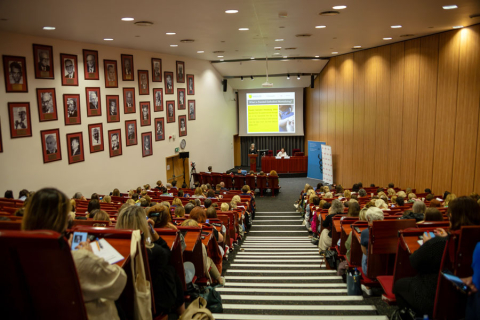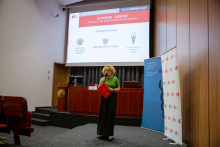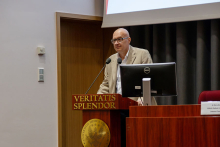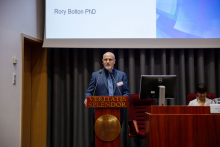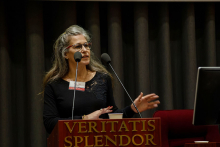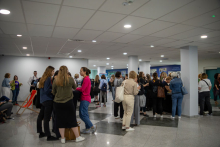The conference was held on June 10 and 11 at the MUW Didactic Center. The guests of the event were welcomed by Joanna Kulpińska, coordinator of the Lighthouse Family Center operating at the Foundation. Among the attendees were representatives of the Warsaw City Hall and other institutions supporting We Give Children Strength Foundation.
Prof. Mariusz Gujski representing the rector of the MUW, the Faculty of Health Sciences and the Department of Public Health, congratulated the organizers and thanked them for the opportunity to co-create this event.
- This is a great pleasure for us, as well as an important duty to our students and society as a whole - said Dean Prof. Gujski, and emphasized - We must make every effort to guarantee children their rights and privileges.
- Creating an environment conducive to children's broader health and preventing violence against them is the foundation for their development - added Magdalena Woynarowska, MD, PhD, from the Department of Public Health.
And, as Dr. Woynarowska stressed, knowledge of child abuse prevention is not only socially important, but will also benefit our students, who, thanks to it, will become a link to effective actions in this area in the future.
Also speaking was Ms. Marta Skierkowska, who emphasized, among other things, the importance of the mentalization method in the prevention of abuse of young children.
Mentalization makes it easier to understand the child
In particular, the conference discussed the role of mentalization as a tool for understanding the child, which can support health and social welfare professionals in preventing violence.
- A unique feature of parental mentalization is the effect the child has on the parent and the parent has on the child. The child's emotional and mental challenges affect the parent and vice versa - the father's or mother's nervousness, stress, impatience are reflected in the child's behavior. Understanding that there is a relationship between the child and parent and that the two interact with each other is crucial for parental mentalizing - explained Dr. Dana Shai of the School of Behavioral Sciences, The Academic College of Tel Aviv Yaffo - It is worth noting that this reciprocal relationship between the caregiver and the child's mind is evident not only in words, but also in non-verbal behavior, as highlighted by Parental Embodied Mentalizing.
- Mentalization - as specialists proficient in its practice emphasize - is nothing more than trying to get to know the real person, their needs, feelings, emotions, rather than confirming our idea of him - said Joanna Kulpińska, coordinator of the Lighthouse Family Center. - In their daily work, the specialists of the Lighthouse Family Center rely on mentalization as a tool to build a patient-therapist relationship, and then a parent-child relationship. It's a working tool that builds mindfulness in the relationship.
The program of the event
On the first day, conference participants could listen to the following lectures:
- “How can mentalization support professionals working with families in the area of early child abuse prevention?” - Dr. Rory Bolton - Anna Freud Centre in London
- “Mentalizing nonverbal parent-child relationships as a tool in preventing violence against young children” - Dr. Dana Shai - Academic College Tel Aviv-Yaffo
- “It will fail without mentalization...about the experience of the NeuanFANg project in working with families of young children” - Karolina Nowak and Rudi Zutz - FAN Familienanlauf e.V., Germany
- “Long-distance therapy - the role of couples therapy in creating a supportive environment for children” - Piotr Kasprzak - Department of Adult, Child and Adolescent Psychiatry, Jagiellonian University Hospital.
On the second day of the event, the following workshops were held:
- “Emotions and emotions regulation in infants and their parents as a basic element in the prevention of abuse of young children” - Lidia Popek, MD, Katarzyna Kwaśny-Czehak, Mazovian Neuropsychiatry Center in Józefów, Child Psychiatry Ward
- “To understand is to protect: mentalization as a key to understanding the child's world” - Aleksandra Wierzejska, Maria Wolak-Chmiel, DOBRA WIĘŹ Psychotherapy Center
- “Seeing the child - group work with parents of young children based on mentalization in the experience of specialists against abuse of young children” - Anna Kossakowska, Magda Winiarska-Smoczyńska, Justyna Wichot-Dreghiciu, Maciej Chodorek, We Give Children Strength Foundation.
The author of the photos: Magdalena Karp
